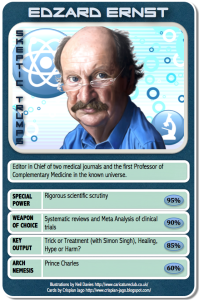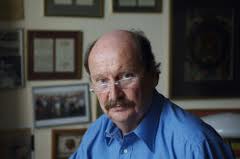Originally published Tuesday, Sept. 10, 2013
 In my last post and several others before, I have stated that consumers are incessantly being mislead about the value of alternative medicine. This statement requires evidence, and I intend to provide it – not just in one post but in a series of posts following in fast succession.
In my last post and several others before, I have stated that consumers are incessantly being mislead about the value of alternative medicine. This statement requires evidence, and I intend to provide it – not just in one post but in a series of posts following in fast succession.
I start with an investigation we did over a decade ago. Its primary aim was to determine which complementary therapies are believed by their respective representing UK professional organizations to be suited for which medical conditions.
For this purpose, we sent out 223 questionnaires to CAM organizations representing a single CAM therapy (yes, amazingly that many such institutions exist just in the UK!). They were asked to list the 15 conditions which they felt benefited most from their specific CAM therapy, as well as the 15 most important contra-indications, the typical costs of initial and any subsequent treatments and the average length of training required to become a fully qualified practitioner. The conditions and contra-indications quoted by responding CAM organizations were recorded and the top five of each were determined. Treatment costs and hours of training were expressed as ranges.
Only 66 questionnaires were returned. Taking undelivered questionnaires into account, the response rate was 34%. Two or more responses were received from CAM organizations representing twelve therapies: aromatherapy, Bach flower remedies, Bowen technique, chiropractic, homoeopathy, hypnotherapy, magnet therapy, massage, nutrition, reflexology, Reiki and yoga.
The top seven common conditions deemed to benefit from all twelve therapies, in order of frequency, were: stress/anxiety, headaches/migraine, back pain, respiratory problems (including asthma), insomnia, cardiovascular problems and musculoskeletal problems. It is perhaps important at this stage to point out that some of these conditions are serious, even life-threatening. Aromatherapy, Bach flower remedies, hypnotherapy, massage, nutrition, reflexology, Reiki and yoga were all recommended as suitable treatments for stress/anxiety. Aromatherapy, Bowen technique, chiropractic, hypnotherapy, massage, nutrition, reflexology, Reiki and yoga were all recommended for headache/migraine. Bowen technique, chiropractic, magnet therapy, massage, reflexology and yoga were recommended for back pain. None of the therapies cost more than £60 for an initial consultation and treatment. No correlation between length of training and treatment cost was noted.
I think, this article provides ample evidence to show that, at least in the UK, professional organisations of alternative medicine readily issue statements about the effectiveness of specific alternative therapies which are not supported by evidence. Several years later, Simon Singh noted that phenomenon in a Guardian-comment and wrote about the British Chiropractic Association “they happily promote bogus claims”. He was famously sued for libel but won the case. Simon had picked the BCA merely by chance. The frightening thought is that he could have targeted any other of the 66 organisations from our investigation: they all seem to promote bogus claims quite happily.
Several findings from our study stood out for being particularly worrying: according to the respective professional organisation, Bach Flower Remedies were deemed to be effective for cancer and AIDS, for instance. If their peers put out such irresponsible nonsense, we should not be amazed at the claims made by the practitioners. And if the practitioners tell such ‘tall tales’ to their clients, to journalists and to everyone else, how can we be amazed that we seem to be drowning in a sea of misinformation?
_____________________________________________________________________________________________________
Edzard Ernst MD, PhD, FMedSci, FSB, FRCP, FRCPEd
Emeritus Professor, Exeter University
 Dr. Ernst qualified as a physician in Germany in 1978 where he also completed his MD and PhD theses. He received hands-on training in acupuncture, autogenic training, herbalism, homoeopathy, massage therapy and spinal manipulation.
Dr. Ernst qualified as a physician in Germany in 1978 where he also completed his MD and PhD theses. He received hands-on training in acupuncture, autogenic training, herbalism, homoeopathy, massage therapy and spinal manipulation.
Later, he became Professor in Physical Medicine and Rehabilitation (PMR) at Hannover Medical School and Head of the PMR Department at the University of Vienna. In 1993, he moved to the UK and became Chair in Complementary Medicine at the University of Exeter. He is founder/Editor-in-Chief of two medical journals (Perfusion and Focus on Alternative and Complementary Therapies).
He has published 48 books and more than 1000 articles in the peer-reviewed medical literature. His work has been awarded with 14 scientific prizes. In 1999, he took British nationality.
His research focussed on the critical evaluation of all aspects of alternative medicine. Unlike most of his colleagues, he does not aim to promote a particular therapy. His goal is to provide objective evidence and reliable information. It is fair to say that this ambition did not endear him to many quasi-religious believers in alternative medicine.
Healthy Skepticism is republishing selections from Dr. Ernst’s blog with permission. Please visit his website at http://edzardernst.com
